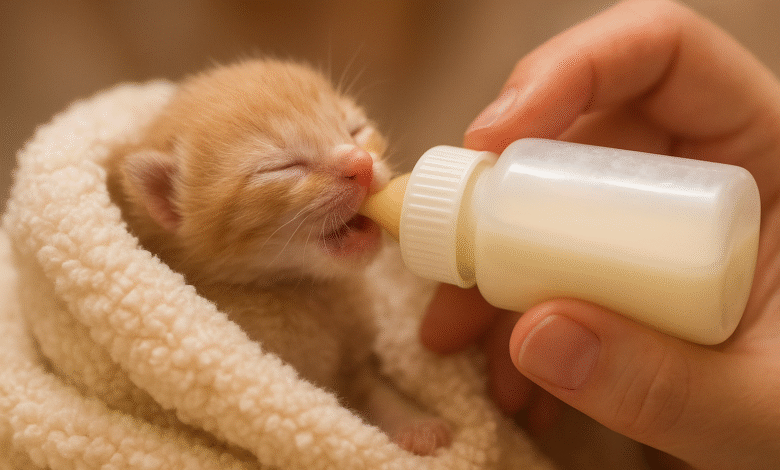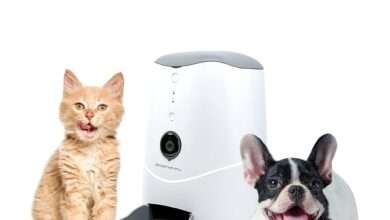What Food Can You Give a Newborn Cat? | Vet-Approved Kitten Feeding Guide (2025)
Caring for a Newborn Kitten

Caring for a newborn kitten is both exciting and delicate. These tiny creatures need warmth, love, and proper nutrition to survive and grow strong. If you’ve found a newborn kitten without its mother or are helping a mama cat care for her babies, knowing what food you can give a newborn cat is very important.
Newborn kittens have different nutritional needs than adult cats. Their digestive systems are still developing, so giving them the wrong food can cause serious health issues. Let’s go step by step to understand how to feed them properly and what foods to avoid.
🐱 What Do Newborn Kittens Eat?
1. Mother’s Milk – The Best Food for Newborn Kittens
In the first 4 weeks of life, mother’s milk is the only food a kitten needs. It contains all the essential nutrients, antibodies, and hydration that help the kitten build immunity and grow.
If the mother cat is present, allow the kittens to nurse freely every few hours. Avoid giving extra food unless the vet suggests it.
2. Kitten Milk Replacer (KMR) – The Best Alternative
If the mother cat is not available or not producing enough milk, use a kitten milk replacer (KMR). Never give cow’s milk, goat’s milk, or rice milk, as they can cause diarrhea, dehydration, and stomach upset.
Best options (vet-recommended):
-
PetAg KMR Powder for Kittens
-
Royal Canin Baby cat Milk
-
Hartz Powdered Milk Replacer
Feeding method:
-
Use a kitten nursing bottle or syringe.
-
Feed small amounts every 2–3 hours (including at night).
-
Keep the milk warm (about body temperature, 98–100°F / 36–37°C).
-
Always hold the kitten belly-down when feeding (never on its back).
🍚 Can Newborn Kittens Eat Rice?
Many pet owners wonder, “Can newborn kittens eat rice?” The short answer is no — newborn kittens cannot eat rice or any solid food.
Why not rice?
-
Their digestive system is too immature to handle grains.
-
Rice offers no essential nutrients needed for kitten growth.
-
It can cause constipation or stomach bloating.
When can kittens start eating solid food?
Around 4 weeks old, you can slowly introduce weaning food — soft, wet kitten food mixed with kitten milk replacer.
At 8 weeks old, kittens can usually eat regular wet kitten food.
🥛 Do Newborn Cats Drink Milk?
Yes — but only the right kind of milk.
✔ Safe milk options:
-
Mother cat’s milk (best)
-
Kitten Milk Replacer (KMR)
❌ Unsafe milk options:
-
Cow’s milk
-
Goat milk
-
Condensed milk
-
Rice or almond milk
These types can cause digestive issues because kittens lack the enzymes to break down lactose and plant-based proteins.
Pro Tip: Always warm the milk slightly before feeding (not hot) and test a few drops on your wrist — it should feel warm, not hot.
🕒 Feeding Schedule for Newborn Kittens
| Kitten Age | Feeding Frequency | Food Type | Notes |
|---|---|---|---|
| 0–1 week | Every 2 hours (day & night) | Kitten milk replacer | Keep kitten warm and dry |
| 1–2 weeks | Every 2–3 hours | Kitten milk replacer | Stimulate to urinate after feeding |
| 2–3 weeks | Every 3–4 hours | Kitten milk replacer | Slightly increase feeding amount |
| 3–4 weeks | Every 4 hours | Start adding wet kitten food + KMR | Begin slow weaning |
| 5–8 weeks | 3–4 times a day | Wet kitten food + water | Fully weaned by 8 weeks |
🧠 How to Feed a Newborn Kitten Properly
-
Wash your hands before every feeding.
-
Prepare fresh milk for each meal (don’t reuse leftovers).
-
Warm the milk to body temperature.
-
Hold the kitten correctly — tummy down, head up.
-
Feed slowly — let the kitten suckle at its own pace.
-
Clean the kitten’s mouth with a warm cloth after feeding.
-
Stimulate elimination by gently rubbing the kitten’s bottom with a soft, damp cotton pad.
-
Weigh the kitten daily — healthy kittens gain about 10–15 grams per day.
🏠 Homemade Kitten Milk Formula (Emergency Use)
If you can’t find kitten milk replacer right away, you can make a temporary emergency formula (not for long-term use).
Homemade emergency kitten formula:
-
1 cup whole goat milk (if available)
-
1 egg yolk (no white)
-
1 teaspoon corn syrup or honey
-
A tiny pinch of salt
Mix well and warm before feeding.
👉 Use only until you can get real kitten milk replacer from a vet or pet store.
🧤 Keeping Newborn Kittens Warm and Safe
Newborn kittens can’t regulate their body temperature. Keeping them warm is as important as feeding.
Tips:
-
Keep their area around 85–90°F (29–32°C) during the first week.
-
Use a heating pad, but cover it with a soft towel.
-
Never place the kitten directly on heat sources.
-
Make a cozy nest box away from drafts and loud noises.
Cold kittens cannot digest milk properly, so always warm them before feeding.
🧩 When to Start Weaning Kittens
At around 4 weeks of age, you can start introducing semi-solid food.
Weaning steps:
-
Mix wet kitten food with milk replacer to make a soupy paste.
-
Offer it on your finger or a shallow dish.
-
Gradually reduce the milk replacer over the next 2–3 weeks.
-
By 8 weeks, kittens should be eating only solid kitten food.
⚠️ Foods You Should Never Give Newborn Kittens
-
Cow’s milk
-
Rice, bread, or cereal
-
Raw meat or eggs
-
Chocolate or caffeine
-
Onions, garlic, grapes, raisins
-
Dog food or human baby food
These can be toxic or cause serious digestive problems.
💧 Do Newborn Kittens Need Water?
No — kittens under 4 weeks old get all their hydration from milk. Once they start weaning, place a shallow bowl of fresh water nearby to help them learn to drink.
🩺 Signs Your Newborn Kitten Is Not Eating Enough
Watch out for these warning signs:
-
Weakness or constant crying
-
Cold body temperature
-
Weight loss or no weight gain
-
Diarrhea or bloated stomach
-
Refusing milk
If you notice any of these, contact a veterinarian immediately. Newborn kittens can get sick very quickly.
🧘♀️ Extra Tips for Healthy Growth
-
Keep feeding bottles and hands sterile.
-
Don’t overfeed — it can cause bloating.
-
Track weight daily with a small scale.
-
Socialize kittens gently after 3 weeks.
-
Take them to the vet for a check-up at 6–8 weeks.
💬 FAQs About Feeding Newborn Kittens
1. Can newborn kittens drink cow milk?
No, cow milk is not safe. It causes diarrhea and dehydration. Always use a kitten milk replacer.
2. What do I do if my kitten refuses to drink milk?
Warm the milk slightly, feed in a quiet area, and try a smaller nipple or syringe. If still refusing, see a vet immediately.
3. How much should a newborn kitten eat?
Roughly 8 mL of milk per ounce of body weight per day, divided into small frequent feedings.
4. Can I give boiled rice water or cereal to kittens?
No. Kittens cannot digest rice or starches until they are at least 8 weeks old.
5. What if I find an abandoned kitten?
Warm it gently, prepare kitten milk replacer, feed small amounts slowly, and visit a vet as soon as possible.




